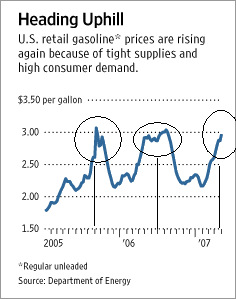The latest Energy Information Agency data show gasoline demand in the past few weeks rose 2.3% from the same period last year, outstripping growth in refinery capacity. That, in turn, is making the U.S. ever more dependent on gasoline imports.
Regular gasoline nationally averaged $2.97 a gallon, AAA reported yesterday. While that's still about nine cents shy of the highest price ever recorded, which was in September 2005, it is a record high this early in the season. Gas was selling for just $2.70 a gallon as recently as the beginning of April.
How high prices go this summer depends largely on what happens to the refineries that crank out the nation's fuel. Refinery outages in recent weeks, largely for maintenance, are part of the reason fuel prices have rocketed up. If refinery operations smooth out, gas prices could remain stable or even fall.
But the picture could be far bleaker if supply interruptions persist or intensify. In 2005, hurricanes Katrina and Rita smashed into the petrochemical-refining belt in the Gulf of Mexico, idling more than a quarter of the nation's refining capacity and sending gasoline prices climbing. Another hurricane striking Louisiana or Texas this year, even if less severe than the storms in 2005, could have a similar effect on pump prices.
"There's very little slack in the system, so it doesn't take a lot to go wrong to send prices higher," says Doug MacIntyre, senior oil-market analyst from the Energy Information Agency, a federal agency.
This highlights a few important points.
1.) Here is a graph from the same article that shows a few years of gas price history. Notice that prices typically spike in the mid to late summer. Notice this year prices are already spiking before the summer. That means we could have some really painful price action by July or August.

2.) This price action shows how silly the inflation ex-energy prices analysis is outside of Federal Reserve policy making. Consumers see total inflation -- inflation with food and energy prices -- every day. Therefore, keeping an eye on total inflation numbers is very important.
3.) The economy withstood higher energy prices last summer. However this year we have a completely different backdrop. We've had a year of sub-par economic growth. We've also had about a year of bad housing news. Those two factors could change the consumer's reaction to high gas prices.